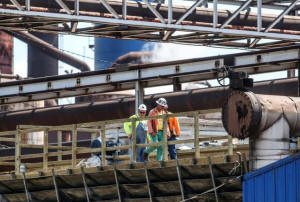|
Trump metals tariffs make Granite City
great again, but at what cost?
 Send a link to a friend
Send a link to a friend
 [May 26, 2018]
By Nick Carey [May 26, 2018]
By Nick Carey
GRANITE CITY, Ill. (Reuters) - After Donald
Trump was elected president in 2016 on a pledge to "Make America Great
Again" and revive the country's old industrial heartland, Dave Chrusciel
hoped someday to return to his previous job at the steel mill here in
this southern corner of Illinois.
That day has arrived. Chrusciel, 61, is one of around 500 workers United
States Steel Corp <X.N> is re-hiring or recruiting as it readies for
production in mid-June at a blast furnace it idled in 2015.
"I'd been waiting for that phone call asking me to come back for more
than two years," he said.
Chrusciel and Granite City are among the winners as the Trump
administration fights a multi-front war to reshape U.S. trade policy.
City officials say the well-paid jobs at the Granite City Works, which
traces its roots to the late 19th century, are the heart of this town of
29,000 people.
"These are jobs you can raise a family on," said Granite City Mayor Ed
Hagnauer. "Those are the jobs we've seen disappear."
Trump imposed the tariffs of 25 percent on steel imports and 10 percent
on aluminum in March. They are popular in Granite City, but problematic
in other communities.

Major U.S. manufacturers as diverse as Caterpillar Inc <CAT.N>, Ford
Motor Co <F.N>, Whirlpool Corp <WHR.N>, Campbell Soup Co <CPB.N> and
Harley-Davidson Inc <HOG.N> have said rising steel and aluminum prices
will have to be passed on to consumers, offset with cost-cutting
measures, or hurt profits.
Bill Hickey, chairman of Chicago-based Lapham-Hickey Steel, which has
half a dozen U.S. steel processing plants, said he wants to help U.S.
steelmakers, but is concerned rising prices will push manufacturers to
duck tariffs by purchasing steel parts overseas.
"The main beneficiary would be China, which has plenty of surplus
steel," he said.
The tariffs are in effect for some countries, and a temporary exemption
for Canada, Mexico and the European Union is supposed to expire on June
1.
Uncertainty over the tariffs' future has left U.S. steel producers'
shares in limbo. U.S. Steel shares surged earlier this year but are now
up just 1.6 percent in the year to date. Nucor Corp <NUE.N> is also up
just 1.6 percent for the year.
COMPANY TOWN
Tariffs created Granite City.
The 1890 McKinley Tariff Act, which increased protective duties, acted
as a catalyst for the nascent U.S. domestic steel industry and created
Granite City in 1896.
Dominated by steel since, the city's fortunes have mirrored the
industry's. Its population peaked at around 40,000 in the 1970s. U.S.
steel-making's decline is reflected in the faded glory of formerly grand
brick buildings, like those in many Rust Belt cities.

Across the Mississippi from St Louis, Granite City sits in Madison
County, which voted for Trump by a 15-point margin.
U.S. Steel has not disclosed its investment in restarting the blast
furnace, which will have an annual capacity of 1.5 million tons of raw
steel, but said in March the furnace would "support anticipated
increased demand for steel" from Trump's tariffs.
"People say tariffs could start a trade war," said Dan Simmons,
president of United Steelworkers' Local 1899, which represents workers
at the plant. "But we've been in a trade war for 15 years and we've been
losing."
Nucor has announced two investments since Trump's tariff announcement,
which a spokeswoman said were part of a long-term growth strategy.
[to top of second column]
|

Steel workers return to work at U.S. Steel Granite City Works after
a two-year idle in Granite City, Illinois, U.S., May 24, 2018. Photo
taken May 24, 2018. REUTERS/Lawrence Bryant

"The impact should be even greater when the remaining tariff
exemptions expire on June 1st," the spokeswoman said.
Granite City business owners say the 500 new jobs - bringing U.S.
Steel's local workforce up to 1,300 - are a much-needed boost.
Joe Jones owns Joe's Hog Doc opposite the plant. His business
repairing and customizing Harley-Davidson bikes has more than
doubled since Trump took office last year and continues to rise.
"The Trump effect is really working," he said. "It's making Granite
City great again."
WHERE JOBS ARE AT RISK
Elsewhere, steel and aluminum price volatility following Trump's
tariff actions puts jobs at risk, company executives said.
Tim Chimera, director of metal procurement for North America at
Norwegian aluminum maker Norsk Hydro <NHY.OL>, said aluminum
consumers have been whipsawed by tariffs and by U.S. sanctions on
the major shareholder of Russian aluminum producer United Company
Rusal Plc <0486.HK>. Norsk Hydro has warned those sanctions could
lead to global supply shortages.
"The big risk I see is the threat to the business overall because of
extremely volatile pricing," Chimera said.
In March, Bob Miller, who heads U.S. operations at top Russian
steelmaker Novolipetsk Steel PAO (NLMK) <NLMK.MM>, said the unit
halted planned U.S. investments of more than $600 million and warned
that its 1,200 U.S. workers' jobs are at risk.
Miller now says his stocks of pre-tariff steel are dwindling, while
Canadian rivals have exploited the tariff exemption.

Like many other companies, NLMK's U.S. unit has applied for an
exemption from the tariffs so it can import Russian steel slabs.
Miller says the Trump administration's response will likely
determine whether he has to lay off workers.
For Granite City steelworker Dave Chrusciel, Trump's commitment to
steel tariffs is crucial. He calls himself a "hard-headed" Democrat,
but voted for the Republican Trump because he believed the
businessman could revive steel jobs.
Although only a year from retirement himself, Chrusciel says his
future vote for Trump depends on the president "seeing it through"
and keeping the tariffs in place.
"Many people here have a lot riding on the tariffs," Chrusciel said.
"Without them, this would be a ghost town."
(Reporting by Nick Carey; Editing by Frances Kerry)
[© 2018 Thomson Reuters. All rights
reserved.]
Copyright 2018 Reuters. All rights reserved. This material may not be published,
broadcast, rewritten or redistributed.
Thompson Reuters is solely responsible for this content.

 |